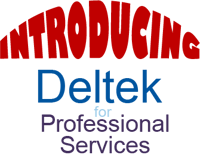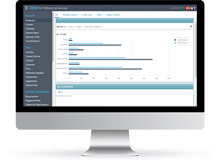To Be a Project Manager or Not to Be…That is the Question
 As I travel around and work with clients implementing Vision Resource Planning, the issue of what makes a good project manager (PM) is often discussed. The PM track has always been perceived as a measurement of success in one’s career. As employees become more tenured within a firm, there seems to be a natural progression to the PM role. However, not everyone who is strong technically is able to effectively manage projects. Based on my experience, to be a good PM requires proficiency in certain key areas.
As I travel around and work with clients implementing Vision Resource Planning, the issue of what makes a good project manager (PM) is often discussed. The PM track has always been perceived as a measurement of success in one’s career. As employees become more tenured within a firm, there seems to be a natural progression to the PM role. However, not everyone who is strong technically is able to effectively manage projects. Based on my experience, to be a good PM requires proficiency in certain key areas.
Scope Management
A good PM must be involved in defining the scope of the project and needs to play a role in the proposal process. Scope can be narrowed down to what has been promised to the client, or in other words, what is to be delivered. The various components of scope are usually defined and controlled by a project’s work breakdown structure and can include interim deliverables and milestones.
Equally, if not more important, a good PM should be aware of what is not in the scope. Scope creep is the number one killer of profit. To avoid this, a good PM needs to be very familiar with what is in the contract and when to ask for change orders.
Schedule Management
Schedule is the order in which the scope needs to be delivered. This is also called a critical path which defines what and when things need to happen to ensure all interim and final scope delivery. A good PM needs to understand the concept of task dependency and how delays and disruptions can impact future delivery. Scope and schedule management work in tandem and scope creep can impact a schedule.
Team Management
A good PM needs to be a committed leader. While “leading by example” may seem cliché, it is a solid guideline to follow as a PM. Even more, a PM must make sure the entire team understands scope and schedule and will keep them inside the white lines to avoid scope creep.
Financial Management
To make prudent, yet quick decisions about the financial health of projects, a PM should be provided reliable data. A good PM should understand what indicators are needed to make this health assessment. I believe earned value is the best indicator. By comparing a project’s physical to financial percent complete, a PM and others can measure the “direction” that the project is heading. Once again, scope creep should easily be identified using this measurement.
Client Management
The human component of project management can be challenging. A good PM should be able to make every client feel important while also filtering and prioritizing so that the scope, schedule and financial components of all projects are properly tended too. A good PM must also be effective in communicating scope creep to the client and should utilize the relationship to secure the change orders that are warranted.
Quality Management
Finally, a good PM must have his “hands” on the product whether it be a report, widget, skyscraper or bridge. He must have the technical knowledge to guarantee the product can pass inspections and be accepted by the client. He must also be able to trouble shoot issues, manage challenges that arise, and always be cognizant of the scope to ensure the work performed is within the contractual obligation to avoid scope creep.
Are Your Project Managers the Right Fit?
All the above must be considered to determine whether someone makes a good PM. A PM may not have mastered all areas, but needs to be effective in each. These key areas are interrelated and critical to one another. Strong technical knowledge does not necessarily translate to successful PM skills. How do your PMs stack up?



 The long-term success of a sports team cannot be determined by looking at just one factor. For a sports team to truly excel, it must triumph on many fronts. From scouting the best talent to strategizing offensive and defensive plays for cohesive team execution, the team manager must create a winning formula that, when utilized, brings continuous success for the team. This is also true for professional services firms, and finding the right formula for your team can become less of a guessing game with the tools available from Deltek. Let’s see how Deltek can help your firm knock it out of the park.
The long-term success of a sports team cannot be determined by looking at just one factor. For a sports team to truly excel, it must triumph on many fronts. From scouting the best talent to strategizing offensive and defensive plays for cohesive team execution, the team manager must create a winning formula that, when utilized, brings continuous success for the team. This is also true for professional services firms, and finding the right formula for your team can become less of a guessing game with the tools available from Deltek. Let’s see how Deltek can help your firm knock it out of the park.
 Welcome to Deltek for Professional Services (DPS), the next generation solution for professional services automation (PSA). If PSA is a new term for you, think of it as a specialized system like an enterprise resource planning (ERP) solution except specifically designed for the professional services industry. Also, check out this short article to
Welcome to Deltek for Professional Services (DPS), the next generation solution for professional services automation (PSA). If PSA is a new term for you, think of it as a specialized system like an enterprise resource planning (ERP) solution except specifically designed for the professional services industry. Also, check out this short article to 
 How does your company measure up to the competition? Are you performing above the industry standards or below? Are you achieving the objectives necessary to continue to grow and operate successfully? In order to answer these questions, management must have a way to track performance. Evaluating the progress of individuals, projects, and specific departments is important, but management also needs an in depth look at the company as a whole.
How does your company measure up to the competition? Are you performing above the industry standards or below? Are you achieving the objectives necessary to continue to grow and operate successfully? In order to answer these questions, management must have a way to track performance. Evaluating the progress of individuals, projects, and specific departments is important, but management also needs an in depth look at the company as a whole.
 First off, you’re thinking what does this perplexing term, professional services automation (PSA), actually mean? Well, before we jump into the need for it, let’s first look at what determines a professional services firm. At its core, a professional services firm sells knowledge and time as opposed to an actual tangible product.
First off, you’re thinking what does this perplexing term, professional services automation (PSA), actually mean? Well, before we jump into the need for it, let’s first look at what determines a professional services firm. At its core, a professional services firm sells knowledge and time as opposed to an actual tangible product.
 The following account is a true story. It begins with an AE firm recognizing the need for change in order to support its growth. This firm quickly realized that bringing disparate systems to one integrated platform like Deltek Vision was the fix they needed.
The following account is a true story. It begins with an AE firm recognizing the need for change in order to support its growth. This firm quickly realized that bringing disparate systems to one integrated platform like Deltek Vision was the fix they needed.


 The long-awaited 38th annual Deltek A/E Clarity report is now available! For those of you who are unaware, each year Deltek performs a detailed Architecture & Engineering Industry study. It is the lengthiest and most thorough study in the industry. Using the A/E Clarity report results, Deltek is able to offer firms unique insights into the AEC industry.
The long-awaited 38th annual Deltek A/E Clarity report is now available! For those of you who are unaware, each year Deltek performs a detailed Architecture & Engineering Industry study. It is the lengthiest and most thorough study in the industry. Using the A/E Clarity report results, Deltek is able to offer firms unique insights into the AEC industry.
 Although it is easy to accept the status quo, there is always room for improvement. Once improvements are made, it is hard to believe that we operated the way we did before. So there it is, the continuous cycle of breaking the status quo to improve our firm processes which ultimately ensures future success. As Deltek Vision users, we should focus on initiatives which enhance our Vision systems and allow us to remain efficient and effective in business.
Although it is easy to accept the status quo, there is always room for improvement. Once improvements are made, it is hard to believe that we operated the way we did before. So there it is, the continuous cycle of breaking the status quo to improve our firm processes which ultimately ensures future success. As Deltek Vision users, we should focus on initiatives which enhance our Vision systems and allow us to remain efficient and effective in business.
 So many people have suggested that I write a book about my travel experiences. After all, I average about 125,000 domestic miles each year and truly believe that, if I decorated my home with cheap hotel art and bolted down my television, my “layover” in Bakersfield, CA would be quite comfortable. Not to mention the miles and miles of test driving countless models of white cars you see in most hotel parking lots. Seriously though, I do love my job, and because it does require me to travel a lot, I have learned much and will now pass some tips on to you.
So many people have suggested that I write a book about my travel experiences. After all, I average about 125,000 domestic miles each year and truly believe that, if I decorated my home with cheap hotel art and bolted down my television, my “layover” in Bakersfield, CA would be quite comfortable. Not to mention the miles and miles of test driving countless models of white cars you see in most hotel parking lots. Seriously though, I do love my job, and because it does require me to travel a lot, I have learned much and will now pass some tips on to you.